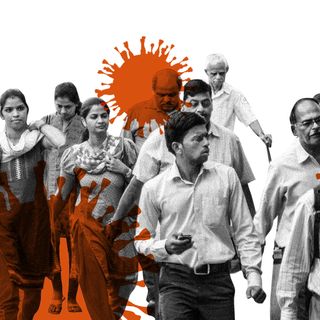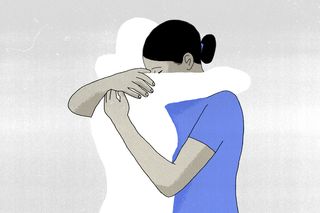
When Talking About Death Is Taboo, How Can Grieving People Heal?
A cultural distaste for talking about death and mental health stigma exacerbate India’s gap in bereavement care.

In 2017, Dr. Savita Butola, a palliative care specialist, came across a patient, an on-duty constable, who had fainted while talking on the phone. The people who had brought the woman into the emergency ward believed she’d had an episode of epilepsy, which could have caused a loss of awareness. But when the patient regained consciousness, she revealed she had lost her father a few days prior. She had not been able to take thetime to mourn his death properly.
And so, the fainting was her body manifesting grief and anguish that had gone neglected and unresolved.
*
Bereavement care, more commonly known as grief counseling, is a system of formalized care and support offered to bereaved and grieving individuals to help them deal with not only the emotional problems that come with the loss of a loved one but also the practical considerations that may arise. It is a sub-practice of palliative care, a field that focuses on improving the quality of life of patients facing a terminal illness or chronic condition, such as cancer, AIDS, or diabetes, and their families. Palliative care — and by extension, bereavement care — is explicitly recognized as a right by the World Health Organization. Each year, an estimated 40 million people need palliative care, 78% of whom live in low- and middle-income countries, such as India. But data shows that less than 1% of India’s 1.3 billion population has access to it.
This figure becomes jarring in the midst of a pandemic, when the global health crisis has not only added to the medical problems in the country but also worsened India’s mental health crisis. The past year has recorded an immense number of deaths — a toll that many people witnessed up close and personal. Most of these deaths did not receive the usual last rites because of Covid19 protocols, denying families the closure such rituals can provide. Further, physical isolation led to less support from friends and family, making the mourning process more difficult than it would have been in normal times.
Addressing grief remains a very important part of palliative care, as it the most prevalent emotion patients and the bereaved go through in the medical processes. “Grief is not a one-time thing that occurs with just death; the losses start much before,” says Dr. Butola, who is also the secretary of Indian Association of Palliative Care. “Known as anticipatory grief, patients and their caregivers go through grief at different stages of their treatment. Loss of job, social life, social status, relationships, future, body image, and such other phases, then become important stages of grief that need to be looked after, for a better quality of life.”
Grief has very tangible and long-lasting ramifications. Priya Thomas, Ph.D., a psychosocial care worker specializing in grief and bereavement at NIMHANS, a Bengaluru-based mental health institute, recalls patients, especially women, who have come with complaints of frequent headaches and backaches; on enquiring further, the latent cause of these physical aches are found in many instances to be unresolved grief.
“The reason getting help while grieving is important is because grief is not something that begins and ends with the death of a loved one,” says Akaanksha, a student whose father died recently. “It is the processes and events that follow after that which make mourning and coping with it much more difficult and can often make you feel lost. When I lost my father to a heart attack, it was the funeral, the clearing away of his belongings, and the very visible loss of his presence afterward that brought a round of grief — and, in fact, still does. In that case, getting help — either from personal support systems or institutionalized care — changes the course of the mourning process and makes things so much easier.”
And while bereavement care is provided more commonly for people who have lost someone to chronic and terminal conditions, it is important in other situations as well. According to psychologists and palliative care specialists, care is most commonly needed by people who are grieving a traumatic death, an unexpected death, or deaths that leave the body disintegrated or unfound — all situations where the bereaved end up without closure. Bereaved people who have lost loved ones to suicide are also in need of special support, experts say.
Related on The Swaddle:
The absence of such care can be deleterious:India saw 381 deaths by suicides every day in 2019; is home to approximately 40 million widowed women; records illnesses as the second-most-common reason for suicide; and sees more than 20% of its population suffer from chronic illness. All of this points to only one thing: that we urgently need to improve our health care and grief support systems. In addition, socio-economically and culturally disadvantaged people, such as widows or people in queer relationships who can’t openly express their grief, also increasingly need such care.
Further, “because a person is preoccupied with grief, something you might not even realize is there, all other avenues of their lives are severely affected,” says Miriam Sequeira, a psychologist at the health NGO Sangath. “That could be your interpersonal relationships, professional life, social life, and any other activities you might be a part of. Since we don’t understand that grief and bereavement can lead to mental health issues, it ends up being untreated. This can impact our physical health, routines, and obviously, mental health, in the longer run.” Studies even show that among older people, a person’s risk of a heart attack and death increases during the six months following their spouse’s death.
*
A large part of the reason we don’t address grief and bereavement is that the country’s general understanding of mental health itself is lacking. “Because of the stigma and limited knowledge associated with mental illness, it is common for the middle-class and the lower-middle-class population of the country to not reach out even when grief becomes dysfunctional,” says Thomas. Even if they did, the country’s mental health infrastructure has daunting gaps. There are just 0.3 psychiatrists, 0.07 psychologists, and 0.07 social workers per 100,000 people in India, according to data from India’s last National Mental Health Survey 2015-16. In such a situation, it is a relatively far-fetched idea for grief to receive care.
This stigma also translates to a lack of anonymous support groups in the country. “Most people that come to hospitals are not very comfortable talking to strangers about their personal problems,” says Thomas. “While anonymous support groups work well in the West, India is still grasping the concept. “
India also presents a unique challenge to dealing with death — societal refusal and cultural hesitance saddle most of the conversations. Most Indians consider it inauspicious to discuss death, much less prepare for it, a 2017 study out of the Tata Institute of Social Science revealed. Because death is considered a bad omen — and that discussing it means inviting it — when it actually does arrive, people are ill-equipped to deal with it.
Sequeira, the psychologist, confirms this, adding that it is not only before death that we choose not to discuss it, but after death as well. “People don’t speak about the internal effects of bereavement following a person’s death. The focus is on getting functional and getting back to responsibilities you had before losing that person,” she says. “This restricts how a lot of people process grief and causes people to move on without processing what is really happening to them.”
Related on The Swaddle:
The Great Misunderstanding of the Word ‘Grief’
In addition, like every other phenomenon and structure in society, grieving and bereavement are not untouched by patriarchy and gender. Women especially end up being a vulnerable group while dealing with loss. From the beginning of the medical process, they are provided with less health care and medical support and are expected to be natural caregivers in illnesses in a way that men are not. Women are also often blamed more than men for any death in the family, and their grieving patterns show guilt and regret in ways male grieving patterns don’t. Moreover, when a husband dies, many wives not only have to struggle with the emotional loss but also may face debilitating financial losses.
Men, on the other hand, are conditioned to display their bereavement through managing the funeral, finances, and property matters. Studies done on grief show that among parents who have lost children or have had stillborn children, fathers often don’t talk about their grief and loss. “A recent workshop that I attended for first responders of suicide, men shared how even among men who are sensitized about mental health and seeking help, there’s more internalized opposition of it,” says Sequiera.
Bereavement care can provide all genders the support they need to get through grief in ways that are tailored to their unique experiences of the emotion.
*
Owing to its cultural resistance to death and loss, India does not have traditional systems of community-led bereavement care in place. On the other hand, institutional care such as hospices, old-age homes, and end-of-life services, while an emerging market, is still largely inaccessible to most Indians.
“This means that we have to find different ways of managing our own practice of care,” says Thomas. “In terms of bereavement support, we require hand-holding support to strengthen the existing systems that are in place. So, institutional support needs to be worked upon, the existing family-based care needs to be strengthened.”
“The incident with the … constable made me realise the dearth of support systems in the country,” says Dr. Butola. “So many people are alone or in situations where they don’t have anyone to support them through their losses.”
So, Dr. Butola, along with other palliative care specialists, started Bereavement Support India, an online platform to spread information about grief and give online support through emails and phone calls. “Currently, we are trying to connect to a number of grief counselors and working on having a network which can provide care all around India,” adds Dr. Butola.
Including bereavement care in the undergraduate curriculum of medical professionals, to make it a part of primary care, is also vital to expanding the safety net for grieving individuals. “The goal is to make people aware that they should be able to demand this care,” continues Dr. Butola. “They should be able to say they need support and demand this very essential part of medical care.”
In the meantime, specialists recommend setting up systems of ‘first responders’ for bereavement, who may be non-specialists but who are trained to provide psychological care under the supervision of a professional. The same way medical first responders are trained to treat physical injury and perform first aid, a force can also be trained to identify if someone might have mental health struggles, including from grief, experts say. They can then provide the first level of support to people and eventually refer them to a professional who can aid them.
But ultimately, societal perception of death, illness, and disability needs to change — to accept death, and everything that precedes it and follows it, as another part of life worth discussing and understanding. Grief, then, becomes not just the aftermath but an inseparable part of the process of loss.
“While all of that is essential, and a way of expanding health care services, I also advocate for every member of society to be ready to provide bereavement support if needed,” Thomas says. “… there is also an awareness that can only come from dialogue in society. So continue talking about it.”
Satviki Sanjay is an editorial intern at The Swaddle. She's currently studying philosophy at Miranda House. When not studying, she can be found writing about gender, internet culture, sexuality, technology, and mental health. She loves talking to people, and you can always find her on Instagram @satvikii.
Related


Why Bright Light Makes Some People Sneeze Uncontrollably
